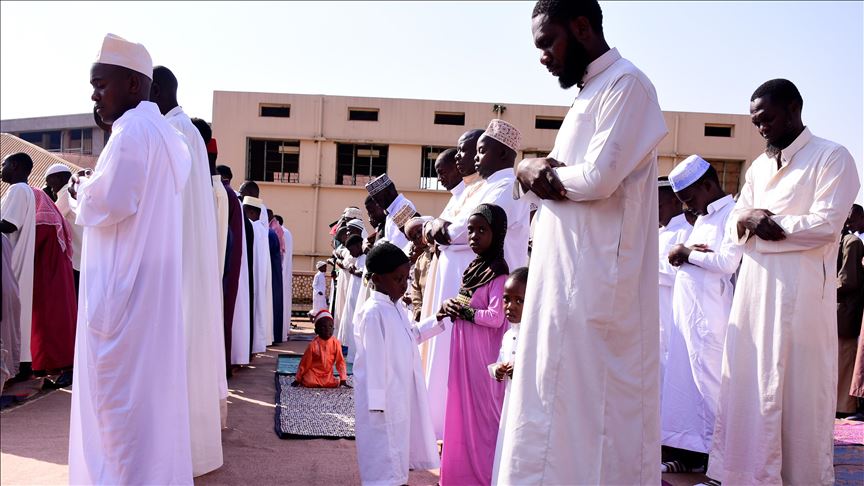 FILE PHOTO
FILE PHOTO
KAMPALA, Uganda
Muslims in Uganda are observing the holy fasting month of Ramadan differently this year amid government restrictions aimed at curbing the spread of the novel coronavirus.
Traditionally in Uganda, the breaking of the fast during Ramadan has been largely a festive, communal affair with a shared meal. Mosques across the country usually host large crowds for iftar, especially targeting the needy.
This year, however, due to the national lockdown and social distancing curbs imposed by the government to halt the spread of COVID-19, Ramadan is not festive and communal iftars are banned.
Charitable food giveaways have also been curtailed because they can expose people to the virus when crowds appear. Instead, charities are being allowed to deliver iftar meals to the needy using individual pre-packed meals to avoid crowded gatherings.
All other Ramadan activities are banned, including the familiar stalls selling food, drinks and clothes at the Uganda National Mosque in the Old Kampala area of the capital.
The mosque is closed to worshippers, although the call to prayer still takes place five times a day. Widespread rules have also been imposed banning praying in all mosques or meeting relatives and friends for large iftar meals.
"It is heartbreaking that we have to come to terms with the fact that through this Ramadan, circumstances forbid us from observing prayers in mosques and of performing the Ramadan night prayers of Tarawih in mosques,” said Sheikh Imran Ssali, an Imam at the national mosque.
"This Ramadan is very different. COVID-19 is with us. We must accept it and abide by the guidelines from the Ministry of Health to protect our lives.”
For some communities in Uganda’s capital, Kampala, who have survived on iftars at the national mosque, the COVID-19 curbs have frustrated them.
Stuart Twine, a construction worker who stays in Kisenyi, a slum on the outskirts of Kampala, said he and many others had been looking forward to Ramadan iftars at the mosque for survival during the pandemic to keep hunger at bay.
"This is the hardest Ramadan we are facing. We don't know how we will cope. The lockdown dried up our savings. We don’t have any money and now we need to survive!” he said.
In Mengo, a Kampala suburb, the lockdown has left Aidah, a fruit vendor, and three of her children in her household jobless and hungry. The government’s promised food rations for the most vulnerable are yet to reach her.
“I cannot find someone to buy my television set. I need to sell it and buy food. I have never seen anything like this before. We are fasting, but we don’t have enough food. That means we have to make do with what very little we have,” she said.
Last month, Uganda instituted a committee led by Prime Minister Ruhakana Rugunda to mobilize relief donations, pool resources and distribute food to the most vulnerable.
The East African country's government spokesperson Ofwono Opondo said everyone in need will receive the food. “Government through the local councils identified the vulnerable people who need support, we know them and we shall reach all of them,” Opondo said.
Meanwhile Ibrahim Ssemujju Nganda a member of parliament said the government is not distributing food to everyone.
“Many people do not have what to eat, they are coming to our gates hoping to get food. You hear someone knocking at your gate, you go to see who it could be and it is a mother with a child strapped at her back. All she wants is food to feed her child. But we also don’t have the food” Semujju said.
While the system of food aid distribution in developed nations is better organized, systems in developing countries are fragmented, making hungry recipients wait longer.
Although there has been no major surge in food prices so far, the food security situation has deteriorated significantly, especially for daily wage workers who were struggling even before the pandemic and have no social safety net. Many of them are stuck in Kampala after a lockdown was suddenly imposed without warning.
“Hunger will kill us instead of the coronavirus. The lockdown is making us suffer more than the disease,” said Karim, a taxi driver in Kampala, who was hoping to break his fast at Wakiso Mosque.
To him, hunger is a more immediate threat than the virus. The limited access to food is linked to the coronavirus pandemic and the ensuing interruption of the economic system in the country arising from the lockdown.
The curfew and restrictions on movement have resulted in a sudden decline in Ramadan relief items because overseas workers and donors do not have enough earnings to send to Uganda.
Anadolu Agency website contains only a portion of the news stories offered to subscribers in the AA News Broadcasting System (HAS), and in summarized form. Please contact us for subscription options.




